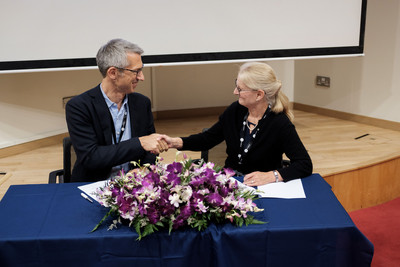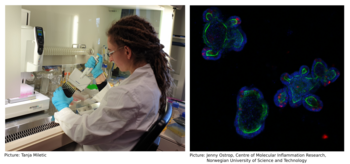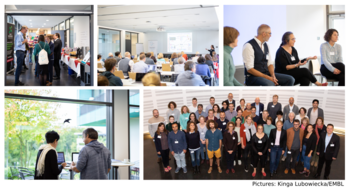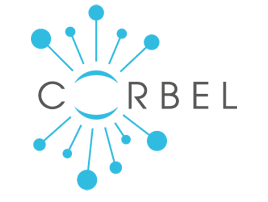| | An Informed Consent Matrix for Multinational Clinical Trials – ELSI Support by CORBEL Experts
Within the CORBEL work package 7, experts from BBMRI-ERIC, ELIXIR, EATRIS, ECRIN and INFRAFRONTIER have joined forces to establish a single and sustainable support mechanism for all European life science research infrastructures (LS RI) dealing with samples and/or data and the ethical, legal and societal implications (ELSI) linked to these activities.
Under the responsibility of the Istituto di Ricerche Farmacologiche Mario Negri IRCCS, a multidisciplinary team has developed an Informed Consent Matrix for Clinical Trials: this guide aims to provide a minimum set of requirements for informed consent aimed at adults in the context of multinational clinical trials. The matrix mainly refers to multicentre interventional randomized clinical trials, but some suggestions can also be applied to non-interventional research. However, it should be adapted to national settings and specific contexts. The guide covers the processing of information (context, language, setting), topics and proposed wording, as well as general suggestions on wording, format and length of the information sheet.
In order to make it widely available, the guide is integrated in the BBMRI-ERIC ELSI Knowledge Base and available for download here. |
| |
----------
Collaboration agreement between Instruct and Euro-BioImaging
In September 2019, Instruct and Euro-BioImaging, two of the 13 research infrastructures (RIs) that are collaborating in CORBEL, signed a collaboration agreement, thereby expressing their will to support joint user access for European life science researchers in the future.
The two RIs for structural biology and advanced imaging technologies, respectively, have been closely collaborating within CORBEL, where they were involved in the development of pipelines for combined service provision. Several research projects from the European life science community were supported by coordinated consecutive access to the high-end services and technologies provided by Euro-BioImaging and Instruct facilities. This demonstrated the need for facilitated cross-infrastructure user access and stimulated the two RIs to establish a long-term collaboration.
To date, a number of collaboration agreements have been signed between the 13 European life science RIs already. These agreements on the long-term RI collaborations recognise and tackle the need to tear down the silos that currently separate scientific disciplines. Working together in the life sciences on interdisciplinary and challenging scientific projects can eventually lead to progress in health and disease, drug discovery and other areas.  Susan Daenke, coordinator of Instruct-ERIC, and Jan Ellenberg, coordinator of the Euro-BioImaging Preparatory Phases and CORBEL WP4 lead, sign the collaboration agreement between the two research infrastructures (Picture: A*STAR/GBI). |
|
| | ----------
Registration is now open for the CORBEL Final Meeting
The final CORBEL meeting will take place on 2 March 2020 in Florence, Italy. The consortium will present their solutions for harmonising user access to the European Life Science Research Infrastructures (LS RIs), comprising topics such as access, data or quality management, training, ELSI and innovation support. Presentations by scientists from the biological and medical user communities will illustrate how concerted access to multiple RIs advanced their projects, thus demonstrating the benefit of CORBEL for European life science research. The one-day meeting will be open to European scientists from the biological and medical field, potential users of the CORBEL common services as well as other stakeholders generally interested in CORBEL and the European LS RIs. More information about the event is available on the CORBEL website. Registration is possible here.
The final CORBEL meeting will be organised back-to-back with the 1st annual general meeting (AGM) of the EOSC-Life project on 3-4 March 2020. EOSC-Life is the new cluster project of the European LS RIs within the European Open Science Cloud (EOSC), aiming at creating an open collaborative space for digital biology in Europe. The 1st EOSC-Life AGM will comprise one day open to selected stakeholders and a second internal day for the consortium. |
| | This section will focus on one of the thirteen research infrastructures participating in CORBEL, providing useful information for current and future users. In this issue, EMPHASIS (the European Infrastructure for Plant Phenotyping) is introduced to the researcher community. |
| |  |
Plants are at the centre of grand challenges posed by increasing requirements for food, feed and bio-based materials. Integrating approaches across all scales from molecular to field applications are necessary to develop sustainable plant production with higher yield and, at the same time, using limited resources.
EMPHASIS is a pan-European distributed plant phenotyping infrastructure project supporting the exploitation of crop genetic diversity required for the enhancement of plant productivity and progress in plant breeding. To that end, EMPHASIS focuses on developing and enabling access to plant phenotyping infrastructure and provision of services, essential for the analysis of crop performance with respect to structure, function, quality and interaction with the environment. Specifically EMPHASIS is currently developing services around five infrastructure pillars: - Plant phenotyping in (semi-)controlled conditions: allowing the investigation of the variability of measured plant traits as a response to well-defined and monitored environmental conditions
- Intensive field sites: enabling detailed study of plant traits under heterogeneous field conditions
- Network of field sites: fostering investigation of the (genetic) variability of plant traits in a range of environmental scenarios under field conditions
- Modelling platforms: enabling the use virtual platforms to support plant phenotyping and improve plant traits analysis from phenotype data
- Plant phenotyping information systems: providing methods and interfaces to manage, share, reuse and visualize heterogeneous plant phenotyping data.
EMPHASIS, currently in the Preparatory Phase, is developing a detailed service portfolio that will be embedded into a sound legal framework. EMPHASIS aims at starting the operations in 2021. |
| | This section will illustrate how consecutive access to multiple research infrastructures offered via CORBEL was able to help European scientists to progress with their research projects. In this issue, a user project selected in the 2nd Open Call, requesting access to EU-OPENSCREEN and Euro-BioImaging resources, is featured: |
| | Establishing high-throughput methods to study ‘mini-guts’
Service Providers:
EU-OPENSCREEN, Leibniz-Forschungsinstitut für Molekulare Pharmakologie (FMP), Berlin, Germany
Euro-BioImaging EMBL Node
The human gastrointestinal tract is a highly sophisticated organ. The gut epithelium consists of several specialized cell types in a distinct spatial arrangement that enable efficient nutrient uptake and forms a barrier against commensal bacteria and pathogens. CORBEL user Jenny Ostrop from the Centre of Molecular Inflammation Research at NTNU in Trondheim, is using organoids - ‘mini-guts’ that form characteristic crypts and villi - to study the intestinal epithelium. Her scientific interest lies in the differentiation of stem cells into the diverse epithelial cell lineages.
‘We are trying to find the molecular ‘switches’ that determine which cell types develop from the stem cells and how the epithelium is composed’, explains Jenny. The organoids are grown in a collagen matrix and their handling is challenging and time-consuming. Having heard about the CORBEL Open Call for research projects from colleagues, Jenny applied for access to the high-throughput screening facilities at EU-OPENSCREEN. During her visit, Jenny was able to automate several working steps in her experimental pipeline, thereby accelerating the workflow. This allowed her to screen a library of compounds that might influence organoid development for their effect on cell differentiation and organoid composition. As the next step, based on the screening results, Jenny is planning to visit Euro-BioImaging to quantify the three-dimensional morphology of the organoids following certain treatments, using advanced microscopy techniques and automated image analysis.
‘I would definitely recommend other researchers to apply for access to the European research infrastructures. Their offer means a great chance to use instruments that you would normally not have access to and to benefit from their expertise.’ - Jenny Ostrop  |
|
| | Webinar: ‘The BBMRI ELSI Services across the Nodes & BMS RIs’
14 January 2020
Speaker: Michaela Th. Mayrhofer (BBMRI-ERIC)
More information will be published soon on www.corbel-project.eu/webinars
BBMRI-ERIC Negotiator: An In-Depth Webinar on Dealing with Sample Requests – for Biobankers and Researchers
14 January 2020
Are you interested in learning how to file a request and respond to a request in the BBMRI-ERIC Negotiator in the most effective manner? Do you want to hear about the recent usability improvements implemented in the Negotiator service? In this talk, BBMRI-ERIC IT and Data Protection Manager Petr Holub will provide an overview of the Negotiator architecture and its integration with findability services and shows practical examples of how to interact with it as a biobanker as well as a researcher. Michael Hummel, Coordinator of GBA and Director of CS IT, will also speak. More information here.
Workshop on Pseudo/Anonymisation of Health Data
22-23 January 2020, Paris, France
This joint CORBEL/EOSC-Life workshop is meant to assess technical solutions for anonymisation and pseudonymisation of data and their GDPR compliance. It will complete the CORBEL data sharing toolkit by providing researchers with guidance on which tools are suitable for which purpose and context. In addition, a possible link to the EOSC will also be discussed, to explore what type of de-identification services would be needed and for which applications (use cases).
“Implementing FAIR data principles in industrial life science research” FAIRplus Innovation and SME event
29 January 2020, Hinxton, Cambridge, UK
The FAIRplus Innovation and SME Forum is a unique opportunity for researchers from academia and industry to come together to discuss challenges and opportunities relating to making data created by the private sector Findable, Accessible, Interoperable and Reusable (FAIR). Further details, programme and registration: https://elixir-europe.org/events/fairsme-2020-hinxton
Workshop: Best practices in Biomedical Public-Private Research Collaborations
13-14 February 2020, Lisbon, Portugal
The CORBEL Innovation Helpdesk team is organizing a best practice workshop on the theme of public-private research collaboration on 13-14 February 2020 in Lisbon, Portugal. This 2-day event will focus on all relevant aspects of setting up such collaborations, from initial contacts through planning and negotiation to completion of legal agreements and project implementation. In addition to plenary lectures covering various aspects there will be a use case for participants to work on in teams. The workshop is aimed primarily at representatives of research infrastructures and academic institutions who are or expect to be involved in the organization and implementation of such collaborative research programmes. More information, the registration link and the agenda can be found here.
ARIA Workshop
25 February 2020, Amsterdam, The Netherlands
Amsterdam plays host to the next ARIA workshop that will be held on the 25th of February 2020. The workshop will be a series of talks that will give a background to the ARIA software and introduce some of its core features. We will be demonstrating the newly released features around visit and session management, including the financial reporting module developed in collaboration with EU-OPENSCREEN. There will also be an interactive feedback session for feedback and ideas gathering to help shape the future of ARIA. We hope that you will be able to join us at the event, supported by CORBEL and iNEXT with the room provided by our friends at the NKI. Learn more & register here.
CORBEL Final Open Meeting
2 March 2020, Florence, Italy
The final CORBEL meeting will take place on 2 March 2020 in Florence, Italy. The consortium will present their solutions for harmonising user access to the European life science research infrastructures (RIs), comprising topics such as access, data or quality management, training, ELSI and innovation support. Presentations by scientists from the biological and medical user communities will illustrate how concerted access to multiple RIs advanced their projects, thus demonstrating the benefit of CORBEL for European life science research.
The one-day meeting will be open to European scientists from the biological and medical field, potential users of the CORBEL common services as well as other stakeholders generally interested in CORBEL and the European life science RIs. More information about the event is available on the CORBEL website. Registration is possible here.
The final CORBEL meeting will be organised back-to-back with the 1st annual general meeting (AGM) of the EOSC-Life project on 3-4 March 2020. EOSC-Life is the new cluster project of the European life science RIs within the European Open Science Cloud (EOSC), aiming at creating an open collaborative space for digital biology in Europe. The 1st EOSC-Life AGM will comprise one day open to selected stakeholders and a second internal day for the consortium.
Workshop 'Data Visualisation for Biology: A Practical Workshop on Design, Techniques and Tools’
16-20 March 2020, EMBL-EBI, Wellcome Genome Campus, Hinxton, Cambridge, UK
As biological datasets increase in size and complexity, we are moving more and more from a hypothesis-driven research paradigm to a data-driven one. As a result, exploration of that data has become even more crucial than in the past.
In this 5-day course, organised by EMBL-EBI in association with CORBEL, we will dive into the topic of biological data visualisation and how it can be used to gain insight into and get a "feel" for a dataset, so that targeted analyses can be defined. We will start by covering theoretical questions such as: What is data visualisation? How do we perceive images? How can we visualise data in the best possible way? It will be delivered through a mixture of lectures and workshop sessions, and will also provide hands-on experience in developing visualisations. The course will focus on working with omics (e.g. genomics, transcriptomics) data rather than e.g. imaging data.
This course is targeted at biologists who want to explore and gain further insight into their own data through the use of visualisation and design approaches.
Application opens: Tuesday 10 September 2019
Application deadline: Friday 24 January 2020
RI-VIS Africa-Europe symposium
23-24 March 2020, University of Cape Town, South Africa
The RI-VIS project brings together Research Infrastructures – organizations created to serve particular research communities – in order to work together more efficiently and effectively. Our 13 partners come from the life sciences, climate science and social sciences to better coordinate research on national and institutional levels.
Now we are looking to exchange know-how with research organizations beyond Europe. Our Africa-Europe symposium, held at the University of Cape Town, South Africa, 23-24 March 2020, will bring together staff from the European infrastructures and South African and other African research infrastructures and institutions who might be interested in collaborations. We also invite representatives from relevant funding agencies as well as policy makers to join and discuss opportunities for working together. By bringing together the right people we hope to create collaborations and initiate networks in a sustainable way so that all stakeholders benefit.
Interested in attending? For more information and to register please see https://ri-vis.eu/network/rivis/events/ri-vis-africa-europe-symposium or contact coordinator@ri-vis.eu.
“Data driven Innovation in the Agritech sector” ELIXIR Innovation and SME event
24 March 2020, Lyon, France
The ELIXIR Innovation and SME Forum is a unique opportunity for researchers from academia and industry to come together to discuss challenges and opportunities relating to data creation, storage, use and analysis in the agritech sector. Further details, programme and registration: https://elixir-europe.org/events/sme-2020-lyon
Training on the data integration platforms tranSMART & cBioPortal
26-27 March 2020, Amsterdam, The Netherlands
Type of course: Face to face
Participants: Data stewards/data managers involved with translational research
The data integration platforms tranSMART and cBioPortal are widely used by researchers and clinicians to integrate, analyse and visualise large amounts of data. In this CORBEL course, data stewards/data managers are offered the opportunity to learn how to upload data to these platforms and how to use the different user interfaces. They will gain insight into these platforms and the possibilities that they offer. Learn more and register here. Deadline: Friday 31 January 2020. |
| | CORBEL users and service providers meet for exchange of experience
On 1 - 2 October 2019, scientists from all over Europe who have been supported by CORBEL and service providers from multiple European life science research infrastructures (RIs) came together at the EMBL in Heidelberg for the 2nd CORBEL Service Operator and User Meeting. Organised by CORBEL WP4, the meeting with around 50 participants aimed to facilitate the interaction between users and service providers, but also among service providers, to demonstrate the value of working together with RIs and to identify processes to be streamlined.
Twelve different research projects, covering a broad range of topics such as drug discovery against acute myeloid leukemia or the study of immune synapse contacts, were presented jointly by the users and the service providers, presenting the scientific background and the progression of the projects, but also highlighting the benefit CORBEL support meant for the project or the service provider facility. The participants explained which hurdles they encountered and gave valuable recommendations for the future direction of joint service provision. ‘CORBEL was of indispensable help to boost our research purpose and went over our expectations in some aspects’, was one of the numerous positive user statements. The service provider facilities appreciated the contact to new users, the increase in user numbers and the variety in project content that they experienced by CORBEL support. Also, their activities within CORBEL contributed to a better understanding of their users’ needs.
In the course of the meeting, the two RIs EMPHASIS (plant phenotyping) and ERINHA (highly pathogenic agents) that both joined the CORBEL consortium in 2017, presented their activities to the participants. In a session addressing ‘Modern research and the data challenge’, the EOSC-Life project was presented by CORBEL (and EOSC-Life) coordinator Niklas Blomberg. Keynote speaker Caterina Strambio from the University of Massachusetts Medical School introduced the 4D Nucleome Initiative and highlighted how data provenance, quality control and unified imaging pipelines increase reproducibility, data quality and fidelity in the field of biomedical imaging. A panel discussion addressed the challenges of modern research being carried out in large consortia in an interdisciplinary manner, covering topics such as the standardisation of data provenance, data FAIRification and the role of data managers and clusters like EOSC-Life as important connectors across disciplines and facilities. Finally, companies presented needs and challenges from their collaborations with research infrastructures in a dedicated industry session.  |
|
| | Euro-BioImaging:
Euro-BioImaging established as an ERIC for state-of-the-art imaging services in biological and biomedical research: The European Commission has officially established Euro-BioImaging as a European Research Infrastructure Consortium (ERIC). With its ERIC status, Euro-BioImaging is now legally recognised as a European research infrastructure for biological and biomedical imaging. Euro-BioImaging offers life scientists open access to imaging instruments, expertise, training opportunities, and data management services that they do not find at their home institutions or among their collaboration partners. All scientists, regardless of affiliation, area of expertise, or field of activity, can benefit from these pan-European open access services. Euro-BioImaging will ensure excellent research and development across the life sciences in Europe. All Euro-BioImaging services are accessible via www.eurobioimaging.eu. Establishment of the Euro-BioImaging ERIC builds on over 10 years of preparatory work with active engagement of 25 national imaging communities, funded by the European Commission and coordinated by the European Molecular Biology Laboratory (EMBL).
Finland will host the Statutory Seat, the access gateway, and manage the overall coordination of Euro-BioImaging, while EMBL will coordinate access to biological imaging, and Italy will coordinate access to biomedical imaging. EMBL will also coordinate Euro-BioImaging’s data services via the BioImage Archive to store and share imaging data. Euro-BioImaging offers state-of-the-art imaging services through its internationally renowned facilities, called Nodes. These Nodes are distributed across Euro-BioImaging’s 15 founding members: Austria, Bulgaria, Czech Republic, Denmark, EMBL, Finland, France, Hungary, Israel, Italy, Norway, Netherlands, Portugal, Sweden, and the UK. Belgium will participate as an observer.
EMBRC:
Communications Officer Position at EMBRC-ERIC: The European Marine Biological Resource Centre (EMBRC-ERIC) is seeking a motivated and experienced science communicator to develop its communication strategy, redesign the EMBRC website, and establish a strong online presence. The communication strategy will involve the development of templates, lines of communications, and guidelines for the 9 national nodes, and 29 operators, to communicate effectively and as one about EMBRC. With a background in communications and science, the Communication Officer will also establish key performance indicators and communication targets together with the executive director and ensure they are consistently achieved. More information here: http://www.embrc.eu/newsroom/job-vacancy-embrc-communication-officer
ASSEMBLE Plus 6th Call: ASSEMBLE Plus opens its 6th call for its TA programme in marine biology research. It offers access to over 30 marine stations and institutes in 15 countries across Europe and overseas for basic and applied research in the marine science field. Researchers from academia and industry can apply for on- site and remote access. Successful applicants will be able to carry out their project free-of-charge. More information here: assembleplus.eu/access/transnational-access
EMPHASIS:
EMPHASIS Moving Toward Implementation: The European Infrastructure for Plant Phenotyping is currently in the preparatory phase (EMPHASIS-PREP) and aims to become operational in 2021. On 31 October 2019, during the 2nd EMPHASIS Ministry Meeting, representatives of nine countries discussed strategies and activities moving the infrastructure closer towards implementation in 2020. Topics included the EMPHASIS service portfolio, pilot services, potential funding models and the selection of host countries. The meeting was hosted by the German Federal Ministry of Education and Research (BMBF) in Berlin. The 3rd EMPHASIS Ministry Meeting will take place as a web conference in February 2020 followed by a meeting in Rome in April 2020. In preparation of its implementation phase, EMPHASIS has also recently introduced a new cooperate identity. The new EMPHASIS logo can be downloaded from the EMPHASIS website.
As part of its outreach activity, the EMPHASIS team presented an interactive EMPHASIS booth during the Science is wonderful! exhibition of the European Research and Innovation Days in Brussels, Belgium, in September. During the exhibition, the team showed a broad audience – from school kids to policy makers – how plant phenotyping is carried out and explained why infrastructures are important for research.
5th Call for Transnational Access to Plant Phenotyping Facilities: EPPN2020 provides researchers from academia and industry access to 31 phenotyping facilities in Europe. The facilities can be used for experiments with either scientific or technological objectives. EPPN2020 has now announced its 5th call for access, which is open to groups from Europe and (to a limited extent) from emerging countries or international research centres. Application can be submitted via the online application platform. The application deadline is 8 January 2020, and the final call will be launched in spring 2020.
ELIXIR:
Looking for a job vacancy or would like to advertise a role you have open for applicants? The ELIXIR vacancy page hosts a range of roles in life science bioinformatics research and software development from both academia and industry across Europe. You can also add roles to the page (https://elixir-europe.org/about-us/vacancies/form) using our simple form. Jobs will be advertised through ELIXIR’s mailing lists and also across other ELIXIR Node websites. |
|

|
This project receives funding from the European Union’s Horizon 2020 research and innovation programme under grant agreement No 654248. |
|
This publication reflects the view only of the author(s), and the European Union cannot be held responsible for any use which may be made of the information contained therein. |
|
|
|

